Sponsored by Nuffic Organization - Netherlands, the Center for Agricultural Innovation, Vietnam National University of Agriculture (VNUA) and the Institute of Plant Breeding, Wageningen University, Netherlands co-organized the training course " Strengthening quinoa value chain in the Mekong Delta, Vietnam" to help scientists, businesses and manufacturers (i) improve skills and knowledge related to unfavorable factors in production quinoa; (ii) improve cultivation techniques and disease management in quinoa; and (iii) grasp the correlation between the supply chain and value chain, and know how to prioritize, map, and analyze the quinoa value chain in Vietnam.
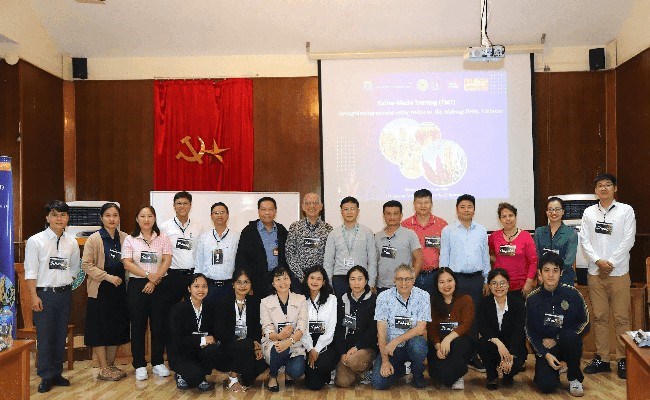
Delegation attending the event
The training course "Strengthening quinoa value chain in the Mekong Delta, Vietnam" took place from November 13 to November 24, 2023 both online and face-to-face at VNUA, attracting managers, lecturers, scientific researchers, and students from different universities and research institutes across the country in the field of plant breeding, plant diseases, crop science, plant physiology, biotechnology, farming techniques and related fields. The enthusiastic participation of representatives from universities such as Tra Vinh University, Can Tho University, Tay Nguyen University, Ho Chi Minh City University of Agriculture and Forestry, Ho Chi Minh University of Technical Education Minh, Tay Bac University and VNUA showed the appeal of the training program as well as the eagerness to learn, improve knowledge and expertise to develop the quinoa value chain, a new crop with great potential.
Opening the training course was a speech by Prof. Dr. Tran Duc Vien, Chairman of the Science and Training Council, VNUA sharing about the strategic cooperation relationship in the field of agriculture between the Netherlands and Vietnam, as well as the results of successful cooperation between Wageningen University, the Netherlands, and VNUA, Vietnam, in the fields of agronomy, plant protection, environment and the development of training programs, in which the Professor highly appreciated the potential for developing the quinoa value chain for difficult areas with drought or saltwater intrusion in Vietnam.
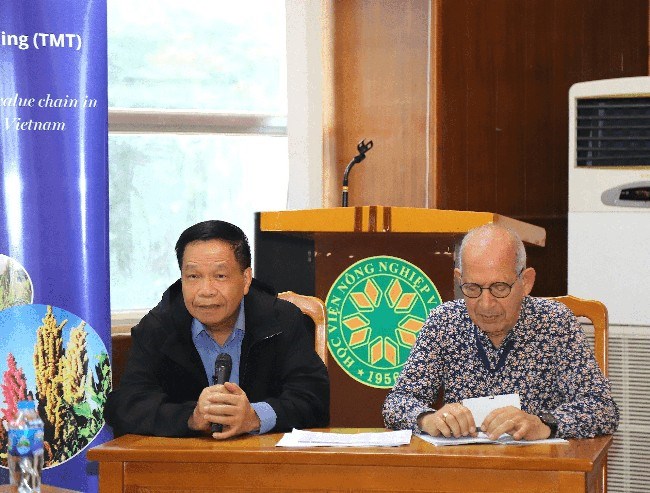
Prof. Dr. Tran Duc Vien delivers a speech at the opening of the training course
After the opening ceremony, the training course officially began with a series of training contents such as:
Module 1: Innovative plant breeding technology for unfavorable factors in quinoa production
• Introduction to unfavorable factors in production and what is necessary to select varieties that are resistant to those unfavorable factors.
• Research and group discussion on the adaptive mechanism of plants in unfavorable conditions.
• Tools for selecting varieties that can withstand unfavorable factors in production (1): Drought.
• Tools for selecting varieties that can withstand unfavorable factors in production (2): Salinity and other conditions.
• Genetic engineering in breeding to create varieties resistant to unfavorable factors in production.
• Practical and hands-on exercises in demonstration and practice models on how to select varieties under high temperature and drought tolerance conditions in the field.
• Evaluate the training course, present action plans, recommendations and follow-ups.
Module 2: Quinoa management strategies under saline conditions
• Practical agricultural integration concept in quinoa production.
• Effectively manage soil, use water, and apply fertilizers.
• Crop production and management technology.
• Integrated pest and disease management strategy.
• Sustainable agricultural management.
• Improve agricultural operations and productivity.
• Training on quinoa testing on crop management and integrated pest management and post-harvest technology.
• Assessment, action plan, recommendations and follow-ups.
Module 3: Developing quinoa value chain
• Concept of value chain
• Value chain map
• From chain analysis to value chain development
• Value chain analysis and tools to perform VCA assessment
• Rapid diagnostic assessment tool
• Tasks of the field research teams
• Assessment, action plan, recommendations and follow-ups
At the training sessions, there were lively discussion sessions between students and Dutch experts on issues related to farming techniques, production, disease management, analysis, development and enhancement of the quinoa value chain in the Mekong Delta region, Vietnam, as well as the possibility of application in Vietnam with the contents presented by:
1. Dr. Robert van Loo: Head of the Department of Resistance Breeding, senior researcher at Wagenigen University, the Netherlands; with 32 years of experience in quinoa breeding and value chain development; training and coaching experience in the Netherlands, Europe, South America, and Asia
2. Dr. Daniel Danial: head of the Department of Biotechnology Human Resources Development, with 40 years of experience at the Crop Research Institute, Wagenigen University, Netherlands; many years of experience in breeding plant varieties with sustainable disease resistance; and training experience in the Netherlands, Europe, South America, and Asia
3. Dr. Angela Machacilla: working at Wagenigen University, Netherlands for 22 years; many years of experience in organizing international training courses; participated in training in the Netherlands, Europe, South America, and Asia
4. Mr. Rene van Rensen, Fresh Studio, Vietnam; many years of practical experience in developing new crop varieties, developing circular agriculture and developing sustainable value chains; importing and exporting agricultural products with training experience in the Netherlands, Europe, South America, and Asia
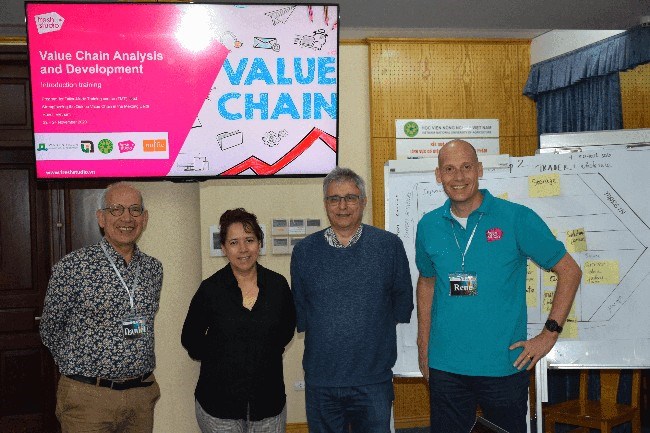
04 Dutch experts, including Dr. Daniel Daniel, Dr. Angela Machacilla, Dr. Robert van Loo and Dr. Rene van Rensen (from left to right)
After the online lessons, the students had practice sessions measuring quinoa plant indicators at the VNUA's greenhouse area. After that, the Organizing Committee organized a field trip to visit the local quinoa farming model.
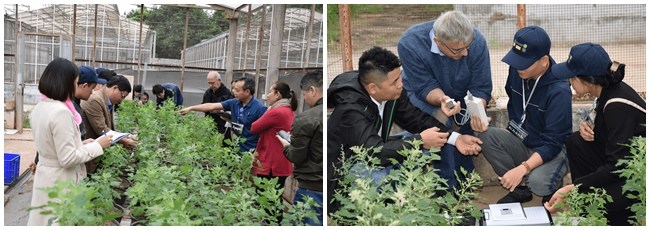
Practice session of students at the net house area at VNUA
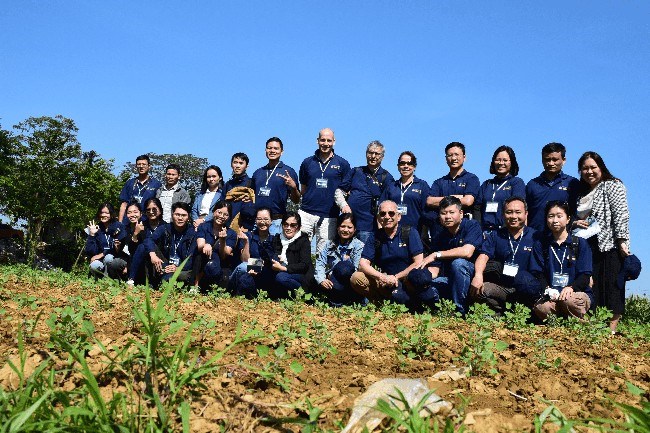
The group visited the quinoa growing model in Phu Tho province
The last day of the Training Course ended with a group presentation. The impressive papers of the participating students and trainees were ranked and highly appreciated by the organizers.
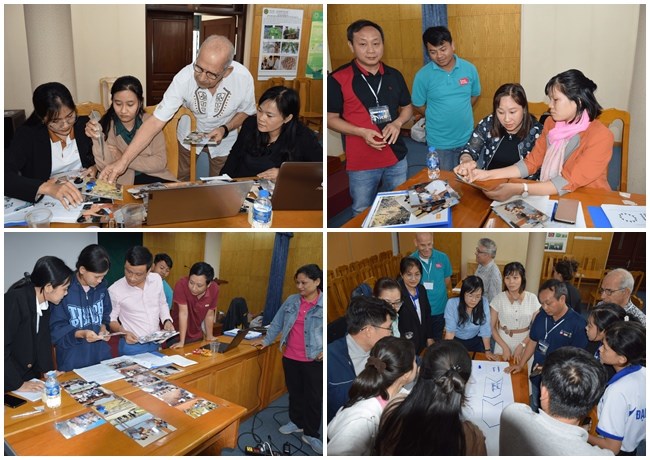
Group preparation session of the students attending the training course
The training course took place successfully and fulfilled the goal of connecting and improving the effectiveness of scientific research, as well as expanding the linkages between universities in Vietnam in the cooperation, the improvement of skills and knowledge, farming techniques and disease management, the analysis and development of the quinoa value chain in Vietnam, as well as in the development of sustainable modern agriculture for Vietnam.
After the training course, Wageningen University and VNUA would continue to develop programs to develop quinoa in the Mekong Delta region to implement the cooperation agreement on capacity building in the field of plant breeding in response to climate change signed in the year 2022.